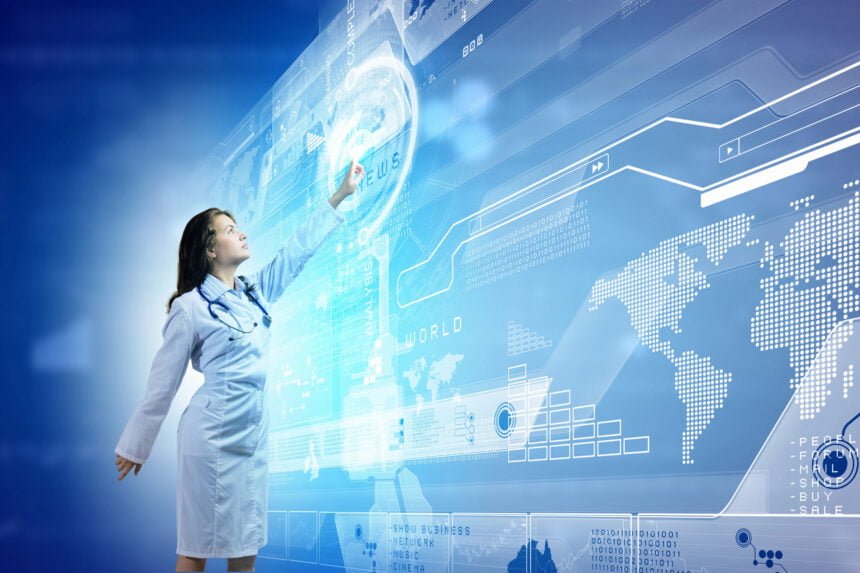Healthcare has come a long way from the days of paper charts and basic tools. Today, we’re seeing a big change in how doctors and nurses care for patients, all thanks to new technology.
- 6 Technologies That Are Changing the Healthcare Industry
- 1. Smart Computers Helping Doctors (AI in Healthcare)
- 2. Doctors Helping from Far Away (Telemedicine)
- 3. Health Trackers You Can Wear
- 4. Super Secure Health Records (Blockchain in Healthcare)
- 5. Health Apps That Treat You (Digital Therapeutics)
- 6. Printing Body Parts (3D Bioprinting)
- Conclusion
From smart computers that help diagnose diseases to tiny devices you can wear that track your health, these new tools are making healthcare better and easier for everyone. They’re not just helping patients get better care – they’re changing how the whole healthcare system works.
In this article, we’ll look at six important technologies that are leading this healthcare revolution. We’ll see how these healthcare technology services are making a real difference in people’s lives and shaping the future of medicine.
From making diagnoses more accurate to letting doctors treat patients from far away, these technologies are opening up exciting new possibilities in healthcare.
6 Technologies That Are Changing the Healthcare Industry
Here are 6 technologies changing healthcare:
1. Smart Computers Helping Doctors (AI in Healthcare)
Artificial Intelligence, or AI, is like a super-smart computer helper for doctors. It can look at complex medical information quickly and accurately, helping doctors make better decisions.
For example, when doctors take pictures of the inside of your body (like X-rays or MRIs), AI can help spot problems that might be hard to see. It’s like having an extra pair of very sharp eyes.
AI can also help doctors choose the best treatment for each patient. It looks at a patient’s health information and suggests treatments that have worked well for similar people.
Another exciting use of AI is in making new medicines. It can quickly test different chemical combinations to find new drugs that might work better or have fewer side effects.
While AI doesn’t replace doctors, it gives them powerful tools to help patients get better care.
2. Doctors Helping from Far Away (Telemedicine)
Telemedicine lets doctors help patients without being in the same room. It’s like a video call with your doctor but with special tools to check your health.
This is great for people who live far from hospitals or have trouble traveling. They can talk to a doctor or nurse from home using their computer or phone.
Telemedicine is also helpful for people with long-term health problems. They can check in with their doctor regularly without having to go to the hospital every time.
During the COVID-19 pandemic, telemedicine became important. It lets people get medical help without risking catching the virus at a hospital.
While it can’t replace all in-person doctor visits, telemedicine makes healthcare more accessible for many people.
3. Health Trackers You Can Wear
Wearable technology, like smartwatches and fitness bands, is changing how we look after our health. These devices can track things like your heart rate, how many steps you take, and even how well you sleep.
Wearing these devices is like having a mini health check-up all day long. They can spot changes in your body that might mean you’re getting sick, even before you feel bad.
For people with ongoing health issues, like diabetes or heart problems, these wearables are helpful. They can keep an eye on important health signs and alert you or your doctor if something’s not right.
Some advanced wearables can even detect falls or irregular heartbeats, which is especially useful for older people or those with heart conditions.
By giving people more information about their own health, these wearable devices help them take better care of themselves and get help when they need it.
4. Super Secure Health Records (Blockchain in Healthcare)
Blockchain is a new way to keep health records safe and easy to share. It’s like a super secure digital filing cabinet that only the right people can access.
With blockchain, your health information is stored in a way that’s very hard for anyone to change or steal. This means your private health details stay private.
This technology also makes it easier for different doctors and hospitals to share your health information when they need to. For example, if you see a new doctor, they can quickly and safely access your health history.
Blockchain can also help track medicines from the factory to the pharmacy, making sure you get the right drugs that haven’t been tampered with.
While it’s still new in healthcare, blockchain could make managing health records much safer and more efficient in the future.
5. Health Apps That Treat You (Digital Therapeutics)
Digital therapeutics are special health apps that do more than just give advice – they help treat health problems. These apps are tested like medicines to make sure they work.
For mental health, some apps use a type of therapy called cognitive behavioral therapy. These can help people manage problems like anxiety or depression, sometimes alongside regular therapy.
For people with long-term health issues like diabetes, some apps coach how to manage your condition. They might remind you to check your blood sugar, suggest meal plans, or even connect to your doctor to share important health info.
These apps don’t replace doctors or medicines, but they give extra support to help people stay healthy. They’re like having a health helper in your pocket all the time.
6. Printing Body Parts (3D Bioprinting)
3D bioprinting is an amazing new technology that can create living tissues and even small organs. It’s like a very advanced 3D printer, but instead of using plastic, it uses living cells.
This technology could help people who need organ transplants. Instead of waiting for a donor, doctors might one day be able to print a new organ that’s a perfect match for the patient.
3D bioprinting is also great for making custom implants and prosthetics (artificial body parts). For example, if someone needs a new knee joint, doctors could print one that’s exactly the right size and shape for that person.
Scientists are even working on printing skin for burn victims and special patches to help heal damaged hearts.
While we can’t print whole organs for transplants yet, this technology is improving fast and could change how we treat many health problems in the future.
Conclusion
Healthcare is changing fast, thanks to new technology. These six innovations we’ve looked at are making big differences in how we manage our health.
Smart computers are helping doctors make better decisions. We can now talk to doctors from home using our phones or computers. Our health records are becoming more secure and easier to share. Special apps are helping treat health problems. And scientists are even working on printing body parts.
All these changes mean we’re moving towards healthcare that’s more personal, more accurate, and easier to access. While there’s still a lot to learn and improve, these technologies are opening up exciting new ways to keep people healthy and treat illnesses.








